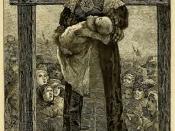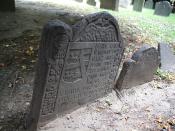Sin, according to the concept of Felix culpa or the fortunate fall, is necessary in human life. Its entire idea is based on the fact that, in order to achieve greatness, man must first "fall". He who rises above his offense evolves both spiritually and morally. In The Scarlet Letter Nathaniel Hawthorne presents the character of Hester Prynne and Arthur Dimmesdale in such a humane way that, instinctively, their suffering and pain becomes a strange object of interest and pity. The manners in which their distress occurs, however, are entirely different. While the reverend undergoes a deep torment of the soul, one that leads to his climatic revelation, the adulteress experiences misery through social estrangement. Either way, both the frail man and the misunderstood woman undergo a drastic metamorphosis that, by the use of a precise novel structure and three balanced scaffold scenes, bring the story to a full circle.
Arthur Dimmesdale; the dutiful minister who cannot admit his own humanity; the troubled lover who cannot expose his hidden adoration; the absent father who must publicly reject his daughter, is the central figure that demonstrates the concept of the fortunate fall. Throughout the entire novel Dimmesdale is the personification of human feebleness, sorrow, and ill-health. However it is not his corporal being that is most affected but his inner one. Hawthorne supports this when he admits, "Wherever there is a heart and an intellect, the diseases of the physical frame are tinged with the peculiarities of these [the intellectual thoughts]." In other words it is Dimmesdales internal turmoil that haunts his physical self and becomes the only apparent connection into his obscured past. His "bodily disease" is no more than a "symptom of some ailment in [his] spiritual part." Being the bearer of such a dastardly secret is a...


